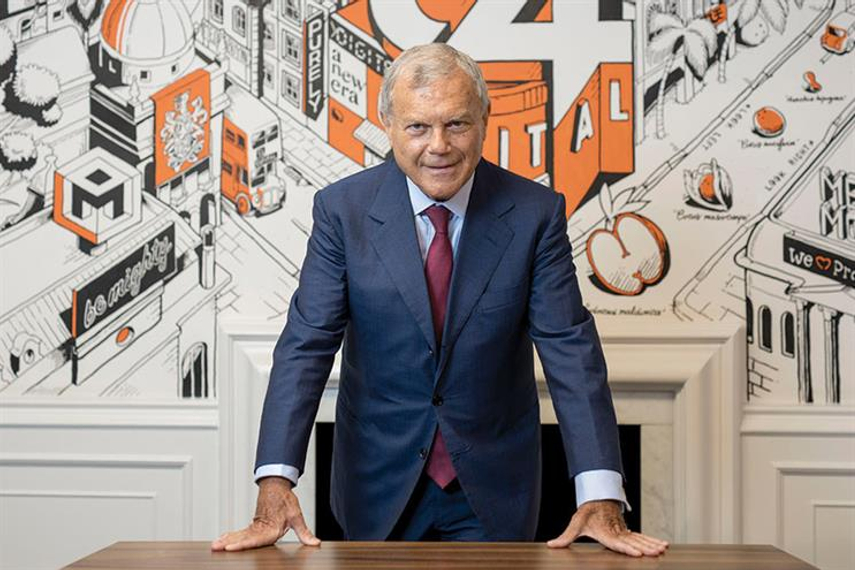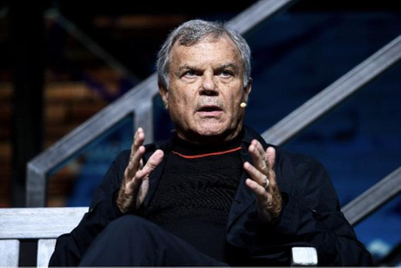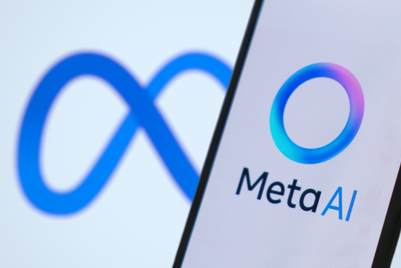
On a flying visit to Germany last week digital agency Monks, together with Google, hosted a customer event called "Get real with AI". During this event, Martin Sorrell, the founder and chief executive of S4 Capital, the parent company of Monks, took plenty of time for personal conversations with selected industry journalists.
In an interview with Campaign Germany, the 80-year-old was in good spirits and, as usual, feisty – especially when it came to others. Criticism of his own holding company, however, which has recently stumbled somewhat on the financial market, is often deftly avoided.
How do you assess the current race for pole position between the advertising holding companies?
The announcement of the merger between Omnicom and IPG has not exactly caused euphoria on the stock market. The financial market does not seem to understand the basis of this transaction. So there is a probability, albeit small, that Omnicom shareholders will reject the takeover. In addition, regulatory problems still need to be resolved to avoid any problem of market concentration. But, assuming the merger goes ahead, we will only be talking about three large advertising holding companies in the future: Publicis, Omnicom/IPG and WPP. I would exclude Dentsu and Havas from this race because one is very Japanese-dominated and the other is considerably smaller than the rest. The two should join forces and combine their business. That leaves four holding companies. After the takeover of IPG, Omnicom would be number one in terms of size and would have overtaken both Publicis and my former holding company, WPP.
You have repeatedly criticised this deal in public. Why exactly?
Yes, because Omnicom seems to have no strategy at all. [Omnicom Group CEO] John Wren has no strategic bone in his body. He's doing a pretty good operational job from Palm Beach, but he is reacting emotionally to the possibility that his holding company will become number one with the help of IPG. IPG is forecasting a 3.7% decline in net income for 2025. If Wren had waited to make his takeover offer, he would definitely have gotten a better price. He simply paid way too much for IPG. Just look at what IPG has lost recently: Microsoft, Verizon, Amazon, Coca-Cola, General Motors, Pfizer, Johnson & Johnson, Lego. We're easily talking about a turnover of $1.5bn. [Interpublic CEO Philippe] Krakowsky is one of the big winners in this deal, as are IPG's chief financial officer and controller. They have provided themselves with a golden parachute because they were the only ones who knew this deal would go through. But the worst is yet to come for the employees.
Are you referring to the predicted layoffs?
Omnicom has announced that it will lay off around 7500 people [$750m in cost synergies, which Sorrell calculates will equate to 7500 jobs]. I think it will be twice as many. It will be pretty bloody. Maybe not this year, but next year when the budgets are combined. Creating synergies ultimately means nothing other than laying people off.
Just like with S4, your holding company – you grew rapidly in the early days with the help of acquisitions and have recently been making headlines mainly with layoffs and poor stock market figures. So not everything is going well at Monks either.
We grew too quickly during the Covid crisis and at our peak we had 9200 employees. Now we have 7200. And you know what? The ratio of personnel costs to sales is still too high. We still have not balanced our staff costs and revenues. That's the honest answer to that.
We'll talk about S4 and Monks in more detail in a moment. First of all, I would like to know whether you think there will be any more major consolidations in the advertising market on the scale of Omnicom and IPG.
I have already said that it would make sense for Dentsu and Havas to merge outside Japan. And WPP should be broken up completely, because they are really losing ground too quickly. The advertising and marketing industry could snap up parts of it. So there will definitely be further consolidation – the strong will swallow up the weak and there will be polarisation just like in the investment banking industry. Two or three large corporations on one side and the boutiques on the other. I can well imagine that this will be the future structure of the industry. In addition, more CMOs can decide either to consolidate their business into a holding company in the future, similar to Coca-Cola, or use smaller strategic and foundational agencies like General Motors.
Which agency brands do you think will consider these various mergers and consolidations and which will not?
As for WPP, it is a disgrace what they have done to their agencies. I cannot understand why brands like JWT, Y&R, Wunderman and Grey should simply be abandoned. I can understand why WPP merged these agencies with digital service providers. But that is no reason to simply abandon this strategic and creative heritage. These strong brands should have been further strengthened with the help of digital know-how instead of giving them up in favour of weaker global brands like VML. What drives WPP reminds me of Luddism in England at the beginning of the 19th century. At that time, primitive workers fought against the loss of status and the impending social impoverishment caused by the onset of industrialisation during the Industrial Revolution and destroyed certain important machines. It was a reactionary, anti-technology movement. From a historical perspective, of course, the storming of the machines achieved nothing.
I wouldn't necessarily consider WPP's behaviour to be anti-technology – in fact, the opposite. VML is used to strengthen a technology-friendly brand. There will certainly be some changes at Omnicom when it comes to agency brands. What do you think about the creation of the Omnicom Advertising Group in this context?
I think that's pretty smart. Omnicom got BBDO, DDB and TBWA and created the OAG to fix the deficiencies in the back office. But what will happen to the IPG brands in this context? Will they keep the McCann brand? Probably. Will MullenLowe and FCB stay? Maybe, maybe not. There will definitely be some back-office consolidation there too. The fact is the traditional creative business is under massive pressure and is continuously being undermined by technological developments. That's why those in charge will have no choice but to carry out further mergers, but with better branding and positioning like Leo – the merger of Burnett and Publicis – a move which reflects the same trends.
It sounds like you no longer believe in creativity.
No, that's absolute nonsense. Of course we at S4/Monks believe in creativity. But not in the traditional way of Don Draper, David Ogilvy or Bill Bernbach. That was creativity in a different era. We can't bring that time back and there's no point in mourning it. Today it's about combining creativity with data and technology. In this context, creativity is ten times more important than it used to be, because in a world where consumers are constantly inundated with personalised advertising messages, outstanding creation is even more important to attract people's attention in even shorter spaces of time.
The business model of S4, or rather of its main brand Monks, is based on the fusion of content, data, creation, AI and media production. You were very successful with this at the beginning. Recently, however, you have stumbled considerably. Your share price has developed less positively. When will S4 or Monks achieve the economic turnaround?
We will publish our 2024 results on 24 March. What I can say now: S4 is expected to be slightly above the forecast net revenue of £746m. In the fourth quarter we saw a sequential improvement over the first three quarters. But to come back to your question: we expect similar results for 2025 because interest rates remain high and customers remain cautious. That's why we will continue to focus on efficiency. I expect that we will benefit from our outstanding AI positioning and will win more orders in this area.
In the race for AI-driven solutions for large advertising clients, Monks is by no means the only service provider. Why do you think your agency can win here?
Monks was voted Adweek’s first and only AI agency of the year, along with several other AI awards. Its Monks.Flow products provide a suite (more than ten) products that simplify workflow in a fast-moving AI eras in visualisation copywriting, personalisation at scale, media planning and buying, general client and agency efficiency and democratisation of knowledge. Our work with Google Hatch, Meta Forever 21, BMW and General Motors for example is cutting edge, as you saw at the Google presentations in Munich.
Where do you see the potential for further savings in order to be on a healthier economic footing? Will there be more layoffs?
We – and by that I mean the entire industry – need to focus more on pricing. After all, we tend to give away an awful lot for free. At Monks, the margin is currently 11 to 12%. Margins also reflect levels of cost in various countries. This inevitably leads to a shift in business to Eastern Europe, South America and Asia.
Are you planning a stronger expansion in these markets – for example in the form of acquisitions?
For S4, the era of growth through mergers is on hold for now. We are currently concentrating on further developing our existing customer relationships and improving our effectiveness and efficiency. With Monks, we are pursuing a single-brand strategy and have a long list of good customers with Google, Meta, a leading NDA-ed telecoms company, General Motors, BMW, Amazon, T-Mobile, Disney, Spotify, TikTok, Disney, Amazon, HP and other brands. Around two-thirds of them are based in the USA, 20% of our business is in EMA and 10% in Asia. From a geographical point of view, the aim should be to generate more business in Asia in the future. I also see growth opportunities in North and South America.
How important is Germany for you in this context?
Germany is, of course, a very important market – just like France, Italy, Spain and Great Britain. The problem we see in Europe is the slow economic growth. While the world is growing by 3%, in the EMEA region it is only 1.5%. In addition, there are geopolitical tensions due to the war in Ukraine and other factors. I am pessimistic about the economic development in Western Europe. I fear that Europe will be on the wrong side of history in the next few years while China, Asia generally, Latin America and the Middle East catch up.
How do you assess the future role of traditional media in Europe and other countries?
Traditional media will continue to have very big problems. Worldwide, $700bn are flowing into digital media, with a growth forecast of 10 to 15%. And this $700bn is dominated by four platform operators: Google, Meta, Amazon and ByteDance. Spending on traditional media is only $300bn – and the trend is declining. If you are a television broadcaster and don't have the broadcasting rights to live sports events like the Super Bowl, the air will become extremely thin for you. I was recently heavily criticised for saying that the job of the CMO has become easier. I stand by that when it comes to media selection.
The CEOs of the big tech platforms are all currently bowing to Donald Trump's policies. What does that mean for the economic development of these companies and what does it mean for the global advertising market?
If you run a large US company and know that you will now have to live with Trump for four years, then you would do well to build the best possible relationship with the new government. In that respect, I can understand why Google, Meta, Amazon and co. are bowing down. You can think what you want about Trump, but the fact is that the economic mood in the USA is currently very optimistic. Trump stands for low regulation and low taxes. Of course, company leaders think that's a good thing. From a business perspective, the last time I saw the USA as optimistic as it is today was in the mid-80s under Reagan. This will have a positive effect on digital advertising revenues in particular. Last week, President Trump signed an Executive Order that allows US companies to bribe government officials. He said that a law against bribery is good, but it puts American companies at a competitive disadvantage. So we are dealing with a completely different world - at least for the next four years.
Will you still be doing this job then? After all, you turned 80 last week. Do you have any plans for retirement yet?
I'm going to do this job until I drop – or as my son always says: I'll probably die in seat 1A.
A version of this article first appeared on Campaign Germany



.jpg&h=334&w=500&q=100&v=20250320&c=1)




.jpg&h=334&w=500&q=100&v=20250320&c=1)







.png&h=268&w=401&q=100&v=20250320&c=1)
.jpg&h=268&w=401&q=100&v=20250320&c=1)
.png&h=268&w=401&q=100&v=20250320&c=1)
